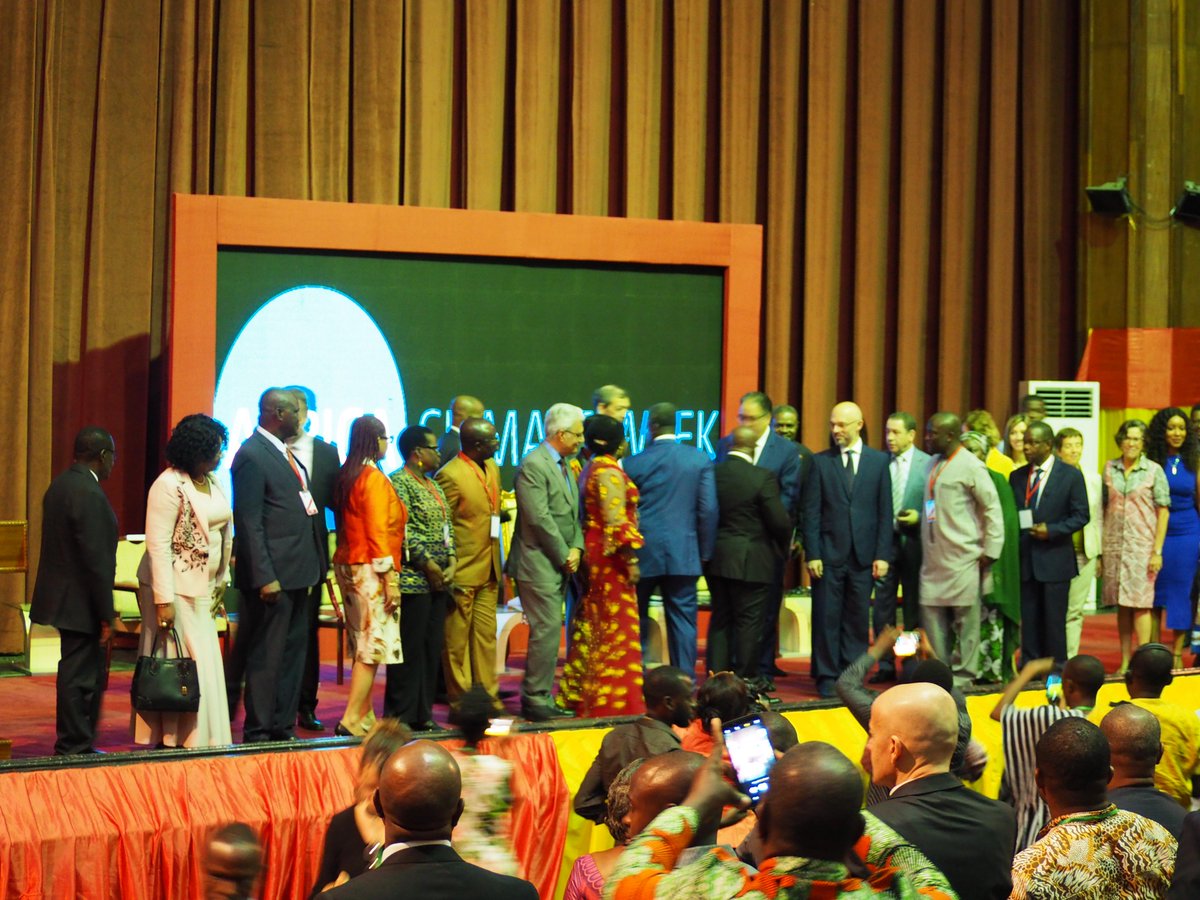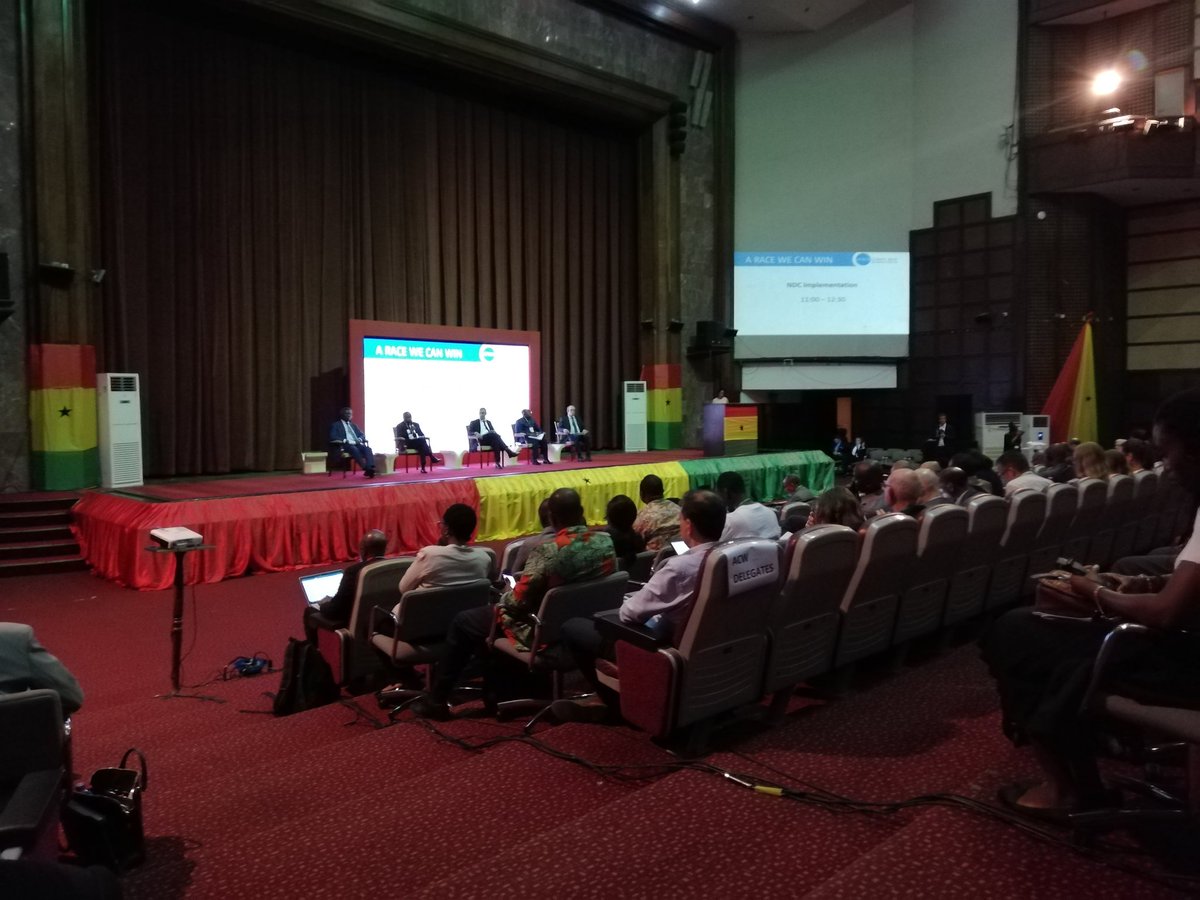18-22 March 2019. Accra, Ghana. Africa Climate Week. the Africa Climate Week (ACW) 2019 was convene in the lead-up to the UN Secretary-General’s Climate Summit in September 2019, bringing together diverse actors from the public and private sectors.
Participants will focused on how engagement between Parties and non-Party stakeholders can be further strengthened in key sectors for Africa, including energy, agriculture and human settlements. The event showcased the role of future carbon markets to enhance climate action towards the goal of sustainable development, and seek to facilitate implementation of countries’ nationally determined contributions (NDCs) under the Paris Agreement on climate change and SDG 13 (climate action), among other Goals.
The purpose of the event is to identify the opportunities for increased ambition in building climate resilient agriculture and food systems in Africa that can be advanced: locally; at the UNSG’s 2019 Climate Summit; and, at COP25.

The event consisted of opening and closing plenaries with six parallel sessions:
Organizers: Common Market for East and Southern Africa (COMESA) and Food, Agriculture and Natural Resources Policy Analysis Network (FANRPAN)
This side event explored the technologies, practices, planning, policies and investment options available for transforming landscapes and food systems, focusing on synergies between adaptation and mitigation in COMESA member States.
Background:
The Africa Climate Week is part of Regional Climate Weeks that are held annually in Africa, Latin America and the Caribbean (LAC) and Asia-Pacific. Regional Climate Weeks are organized by the Nairobi Framework Partnership (NFP), which supports developing countries in preparing and implementing their NDCs.
The events’ global partners are the UNFCCC, Word Bank, UN Development Programme (UNDP), UN Environment Programme (UNEP), UNEP Partnership with the Technical University of Denmark (UNEP-DTU Partnership), Climate Technology Centre and Network (CTCN) and International Emissions Trading Association (IETA). Regional partners include the African Development Bank (AfDB) in Africa, Inter-American Development Bank (IDB) in LAC and Asian Development Bank (ADB) and UN Economic and Social Commission for Asia and the Pacific (ESCAP) in Asia-Pacific.
Participants will focused on how engagement between Parties and non-Party stakeholders can be further strengthened in key sectors for Africa, including energy, agriculture and human settlements. The event showcased the role of future carbon markets to enhance climate action towards the goal of sustainable development, and seek to facilitate implementation of countries’ nationally determined contributions (NDCs) under the Paris Agreement on climate change and SDG 13 (climate action), among other Goals.
Extract of the programme:
18/03 Stepping Up Action to Build Climate Resilient Agriculture and Food Systems in AfricaThe purpose of the event is to identify the opportunities for increased ambition in building climate resilient agriculture and food systems in Africa that can be advanced: locally; at the UNSG’s 2019 Climate Summit; and, at COP25.

The event consisted of opening and closing plenaries with six parallel sessions:
- Farmers’ Climate Resilient Practices: Taking action to reduce climate risks at farm and ecosystem levels.
- Climate Resilient Ambition Powered by Nature: Building the case for nature based solutions (NBS) in Africa’s agriculture and food system
- Colliding Climate and Conflict Risks in Fragile and Vulnerable Contexts: Building resilience from an integrated approach in the most vulnerable places.
- Scaling up Private Sector Investment to Build Resilience in Agriculture: Showcasing climate actions from businesses, insurers and government on microcredit, risk transfer, food value chain for climate resilient agriculture and food sectors
- Large Scale Restoration and Agroforestry, Lessons from Africa: Learning from Ghana Cocoa and Forest Initiative from, Great Green Wall Initiative and AFR100 - African Restoration Initiative.
- Early Warning- Early Action and Forecast Based Financing: Implementing Early Warning- early Action and Forecast Based Financing approaches

Organizers: Common Market for East and Southern Africa (COMESA) and Food, Agriculture and Natural Resources Policy Analysis Network (FANRPAN)
This side event explored the technologies, practices, planning, policies and investment options available for transforming landscapes and food systems, focusing on synergies between adaptation and mitigation in COMESA member States.
- Mclay Kanyangarara, COMESA Climate Advisor
- Irene Annor-Frempong, Divisional Manager and Strategic Priority Leader, FARA
- Abebe Haile-Gabriel, Assistant Director-General and Regional Representative for Africa, FAO
- Stephen Muwaya, Program Coordinator, Ministry of Agriculture, Animal Industry and Fisheries, Uganda
- Tammy Muzi Dlamini, Agri Business Manager at National Marketing Board (NAMBoard), Eswatini.
Background:
The Africa Climate Week is part of Regional Climate Weeks that are held annually in Africa, Latin America and the Caribbean (LAC) and Asia-Pacific. Regional Climate Weeks are organized by the Nairobi Framework Partnership (NFP), which supports developing countries in preparing and implementing their NDCs.
The events’ global partners are the UNFCCC, Word Bank, UN Development Programme (UNDP), UN Environment Programme (UNEP), UNEP Partnership with the Technical University of Denmark (UNEP-DTU Partnership), Climate Technology Centre and Network (CTCN) and International Emissions Trading Association (IETA). Regional partners include the African Development Bank (AfDB) in Africa, Inter-American Development Bank (IDB) in LAC and Asian Development Bank (ADB) and UN Economic and Social Commission for Asia and the Pacific (ESCAP) in Asia-Pacific.




No comments:
Post a Comment